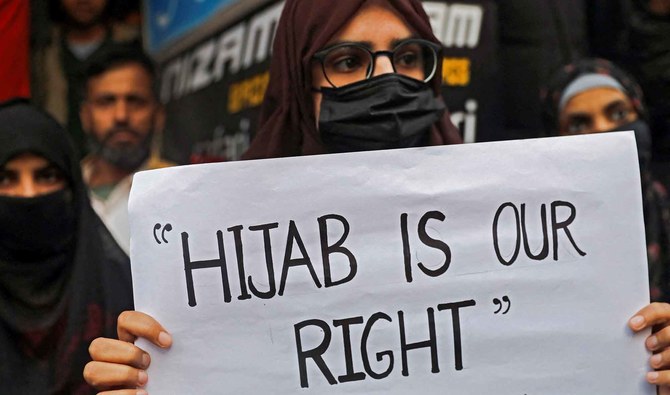NEW DELHI: Authorities in the southern Indian state of Karnataka closed schools and banned gatherings on Wednesday after protests over Muslim women wearing headscarves in the classroom turned violent.
The controversy began in late January when six girl students at a government-run senior high school in the state's Udupi district started a protest after they were barred from attending classes for wearing the hijab.
As last week the state government backed the school's authorities and banned wearing headscarves at educational institutions, the peaceful protest by schoolgirls attracted media attention, demonstrations in their support as well as counter-protests by some Hindu groups.
On Tuesday, the rallies turned violent, with reports of stone throwing and arson promoting the chief minister of Karnataka to order all educational institutions to shut for three days. Police in the state's capital imposed a ban on all kinds of gatherings near educational institutions for the next 10 days.
Bangalore police commissioner Kamal Kant said in a statement the ban had been imposed as "at some places, these protests have led to violence" and it was "essential to implement proper security measures to maintain public peace and order."
The students whose protest spread to other schools said the events were unprecedented and they had never faced any problems over wearing the hijab in the state where 12% of the population is Muslim.
"This is an unnecessary controversy, and we never faced an issue wearing hijab in the school in past," Almas AH, one of the girls, told Arab News.
The ban has raised fears among Muslim students in the state ruled by Prime Minister Narendra Modi's Hindu nationalist Bharatiya Janata Party.
"There has never been an issue with us wearing hijab," Aysha Byndoor, another protester from Udupi. "Hijab is our cultural marking and it's our choice."
The Association for Protection of Civil Rights APCR, which filed a petition with the Karnataka High Court, said the ban was against the country's constitutionally guaranteed diversity.
"India is a country known for its diversity and the constitution protects this," APCR secretary general Nadim Khan told Arab News.
“We have trust in the court. This is a sensitive issue. The Hindu rightwing is trying to impose its cultural nationalism where it wants to impose majoritarian choice on the people following different religious practices."
The court on Wednesday requested the chief justice to set up a larger bench to decide whether the ban violated the fundamental rights of individuals or not.























